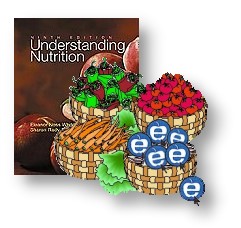|
|

| |
| What happens when you
take an established course that is already popular with students, remove a lot
of the class lecture time, add a good portion of online course work, season
with a dash of love, and blend thoroughly with an excellent Course Management
System (CMS)? The results are amazing! |
| |
|
|
BIO 204 Biochemical Nutrition is a
study of the chemical basis of nutrients and foods and their use in diet and
therapy. This course is designed for students in preprofessional programs
leading to careers in health care areas. Because nutrition plays a significant
role in both health and disease, emphasis is placed on basic nutrition concepts
as well as on diet therapy for management of common health
conditions.
The main ingredients for
this recipe:
Textbook
and Online Ancillary Materials
 |
Whitney and Rolfes. 2002.
Understanding Nutrition, 9th Edition. Thomson/Wadsworth.
ISBN for textbook bundled with
Diet Analysis 6.0 online : 0534099688
ISBN for Diet Analysis online alone:
0534594204
An extensive
Student
Companion Web Site, maintained by Thomson Learning, provides students with
the opportunity to utilize Web resources and multimedia techniques in order to
reinforce learning of the concepts covered in the text. |
|
In addition to mastering
material from the textbook, students completed the Diet Self-Study exercises
using the
Diet
Analysis Plus software which is available online and may be bundled with
the textbook. |
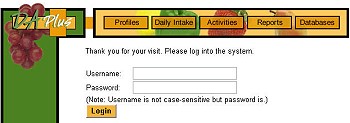 |
 Top of Page Top of Page |
| |
| |
| |
Course
Management System (CMS)

Judson College adopted
Ucompass Educator, a very powerful and
flexible course management system (CMS), in Fall 2002. All Judson courses have
an online presence through Educator, and its use is expanding across the
campus. All of the students thus were familiar with the software and eager to
use all of the components. |
 |
|
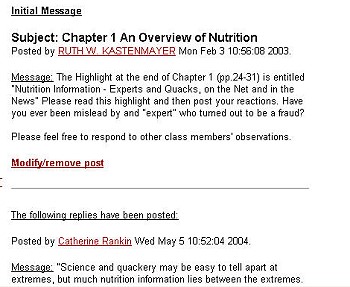 |
 The students were most enthusiastic about the
online discussions which enabled them to argue and trade links into the early
hours of the morning. The students were most enthusiastic about the
online discussions which enabled them to argue and trade links into the early
hours of the morning.
 Since the
discussion is online, adding links to items of interest on the Web is very
simple and insures that they are readily accessible during the discussion. Since the
discussion is online, adding links to items of interest on the Web is very
simple and insures that they are readily accessible during the discussion.
|
| |
|
| |
|
|
 The course included thirteen practice quizzes,
four unit exams, and a final exam. All of the assessment was done online
through Educator. The final exam was a two-hour, proctored exam administered in
the computer lab. The course included thirteen practice quizzes,
four unit exams, and a final exam. All of the assessment was done online
through Educator. The final exam was a two-hour, proctored exam administered in
the computer lab.
|
|
 It sure is easier to
read and grade all those essays when they are typed and easy to read on the
screen! It sure is easier to
read and grade all those essays when they are typed and easy to read on the
screen!
|
 |
 Top of Page Top of Page |
| |
| |
| |
"Seven
Principles" Implementation
One of the most widely quoted articles
is "SEVEN
PRINCIPLES FOR GOOD PRACTICE IN UNDERGRADUATE EDUCATION" which was written
by Arthur Chickering and Zelda Gamson as a summary of teaching-learning
activities that, according to educational research, usually improve educational
outcomes.
|
For the 2003-2004 academic year,
Judson College Faculty
Development Workshops have used the resources provided by the
TLT Group to focus on using Educator to
improve educational outcomes. This Biochemical Nutrition course is the result
of using the power of the CMS to blend the text and the online components in
order to strengthen student learning.
Much of the face-to-face lecture
time was replaced with active learning experiences which communicated high
expectations and contributed to time on task. Cooperation among students was
fostered in the Nutrition Dinner, and respect for diverse talents and ways of
learning were reflected in the broad array of learning tools on the textbook
companion site. |
| According to Chickering and Gamson:
" Good
practice in undergraduate education:
- encourages contact between students and faculty,
- develops
reciprocity and cooperation among students,
- encourages active learning,
- gives
prompt feedback,
- emphasizes time on task,
- communicates high expectations,
- and
respects diverse talents and ways of learning."
|
|
|
 The instructor and students were in daily
communication through Educator email and online discussion board. Feedback both
from student to instructor and from instructor to student was immediate and
ongoing throughout the course. The instructor and students were in daily
communication through Educator email and online discussion board. Feedback both
from student to instructor and from instructor to student was immediate and
ongoing throughout the course.
|
|
| |
| |
| |
Nutrition Dinner
|
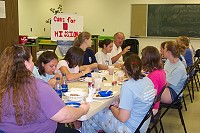 |
One of the highlights of this
course is the nutrition dinner. While the dinner is "real" and face-to-face,
students used email and the online discussion board to discuss nutritional
principles that they had learned, to plan a healthful and also delicious meal,
to coordinate tasks, and decide how to shop for the food, and prepare and serve
the dinner to the class and invited guests. More ... |
|
 Educator allowed the students to stay in
communication at all times even though several were day students and almost all
of the students went home for the weekends. Educator allowed the students to stay in
communication at all times even though several were day students and almost all
of the students went home for the weekends.
|
 Top of Page Top of Page |
| |
| |
| |
Online Survey
|
A survey was administered in
Educator so students could offer their opinions about the success of this pilot
"blended" course. The results were very positive. Here are some examples of
student comments:
- "I think the most valuable part of
this class has been the ability to learn on my own yet still have the Deadline
of the few class meetings."
- "Many of the lessons I learned in
this class will stay a lifetime. Health is essential. I know that I must
improve my health and portray more self-control in my diet. My favorite thing
about this course was the discussion online. I think that really brought up a
lot of interesting topics."
- "I think that the most valuable part
of this course is the time issue. It will fit into almost anybody's
schedule."
- "I really enjoyed the diet analysis.
The software was easy to use. I think that I am more aware of the things that I
eat and that I will remember this for the rest of my life."
- "The online diet analysis was
helpful. I really liked it. Overall, I think that the course was helpful. The
dinner was a nice addition. The online discussion also caused me to think."
|
 Top of
Page Top of
Page |
| |
| |
Results
On the first unit test I was surprised
that the scores were higher than they have been in a traditional class with a
lot of lecture time. One of the students remarked, "Well, you are making us
read the whole chapter instead of just telling us what we are supposed to
know." Overall, the test and exam scores were higher than in my previous six
times of teaching the course. There was a marked increase in student interest
and enthusiasm. Since everyone had had to complete the quizzes before the class
meeting time in order to earn the points for them, I could start a lecture with
a question such as, "Was there anything in Chapter X that surprised you?" and
have a bunch of hands eagerly go up.
There were, however, some disadvantages
as well. There was more emphasis on learning by reading rather than by hearing,
so perhaps the visual learners were given a significant advantage. Also,
conducting this course during the Short Term condensed schedule and faster
pacing was perhaps a disadvantage for this "blended" approach to teaching as it
reduced the time available for review. Blended BIO 204 will probably prove to
be even more effective as a course offered during the Fall or Spring
normally-paced semesters. |
 Top of
Page Top of
Page |
| |
| |
Conclusions
|
|
By substituting a considerable amount
of online coursework for the more traditional lecture time, I have placed the
responsibility on the students to learn and think for themselves. In analyzing
grade results as well as student feedback I am convinced that this course has
been significantly more effective in promoting student learning and retention
than the traditional course has been.
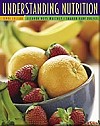 |
I am currently rewriting
the course for the newest edition of the textbook and I am planning to offer it
again as a "blended " course in Spring 2005. |
In order to reinforce student learning
and accommodate to different learning styles, I am going to use MS Producer to
add voice narration to the slides provided for each chapter. This will help
those students who learn best by hearing rather than by reading.
 These
"mini-lectures" will be available for download from Educator so that the
students will be able to listen to them as many times as they wish. These
"mini-lectures" will be available for download from Educator so that the
students will be able to listen to them as many times as they wish.
I intend to add one of the Internet
exercises that are listed on the Publisher's Web site for each of the chapters
that I cover. These will be due before the class discussion
period.
I would like to expand the use of the
online Diet Analysis Plus in order to add one hour of laboratory credit for the
course. |
 Top of
Page Top of
Page |
| |
| |
Thank
you, Ucompass!
|
| |
|
|
| None of this would have been possible
without Educator. Thanks, Ucompass, for all of your support and
encouragement! |
|
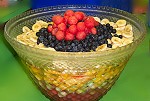 |
| Ruth Kastenmayer -
Director, Judson TLT Center |
|
|
| |
| |
|
| |
| |
|
 |
Ucompass.com Inc. is very pleased to
be working with the faculty and students of Judson College as part of our
"Small Campus Full Implementation Package". Our partnership brings Judson all
the tools necessary for running a state of the art online course offering. The
faculty and administrators at Judson College bring their expertise and
enthusiasm to enhance learning for students using the online teaching
component. We look forward to continuing this successful partnership and
expanding the teaching and learning landscape for faculty and students at
Judson College. |
| Edward B.
Mansouri - President, Ucompass.com, Inc. |
| |
|
 Top of Page Top of Page
|
| |
|
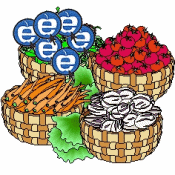 Thank you to our visionary
Judson Administration and my cooperative and enthusiastic students, Melissa
Benson, Brandi Butler, Dani Cooper, Jessica East, Rebecca Gray, Katie
Hoggle,Tiffany Jernigan, Tiffany Little, Leslie Miller, Ashley Parsons,
Catherine Rankin , and Angela Wilson! I appreciate the oversight and advice
from faculty in both the Science Division and Social Sciences Division. Support
from my colleagues on the Judson IT Team was truly invaluable. Thanks also for
the guidance and supporting materials from the
TLT Group and
Thomson/Wadsworth, a division of
Thomson Learning. Thank you to our visionary
Judson Administration and my cooperative and enthusiastic students, Melissa
Benson, Brandi Butler, Dani Cooper, Jessica East, Rebecca Gray, Katie
Hoggle,Tiffany Jernigan, Tiffany Little, Leslie Miller, Ashley Parsons,
Catherine Rankin , and Angela Wilson! I appreciate the oversight and advice
from faculty in both the Science Division and Social Sciences Division. Support
from my colleagues on the Judson IT Team was truly invaluable. Thanks also for
the guidance and supporting materials from the
TLT Group and
Thomson/Wadsworth, a division of
Thomson Learning.
Finally, thanks to all my
friends at Ucompass. Here's to the
future!
Ruth Kastenmayer
June
2004 |

 Thank you to our visionary
Judson Administration and my cooperative and enthusiastic students, Melissa
Benson, Brandi Butler, Dani Cooper, Jessica East, Rebecca Gray, Katie
Hoggle,Tiffany Jernigan, Tiffany Little, Leslie Miller, Ashley Parsons,
Catherine Rankin , and Angela Wilson! I appreciate the oversight and advice
from faculty in both the Science Division and Social Sciences Division. Support
from my colleagues on the Judson IT Team was truly invaluable. Thanks also for
the guidance and supporting materials from the
TLT Group and
Thomson/Wadsworth, a division of
Thomson Learning.
Thank you to our visionary
Judson Administration and my cooperative and enthusiastic students, Melissa
Benson, Brandi Butler, Dani Cooper, Jessica East, Rebecca Gray, Katie
Hoggle,Tiffany Jernigan, Tiffany Little, Leslie Miller, Ashley Parsons,
Catherine Rankin , and Angela Wilson! I appreciate the oversight and advice
from faculty in both the Science Division and Social Sciences Division. Support
from my colleagues on the Judson IT Team was truly invaluable. Thanks also for
the guidance and supporting materials from the
TLT Group and
Thomson/Wadsworth, a division of
Thomson Learning.
